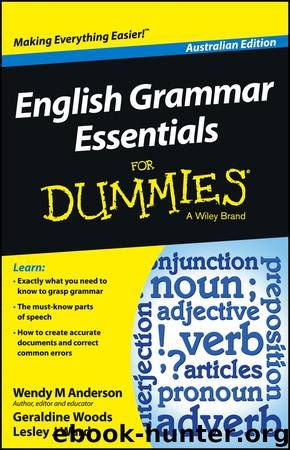English Grammar Essentials For Dummies by Wendy M. Anderson

Author:Wendy M. Anderson
Language: eng
Format: epub
Publisher: Wiley
Published: 2013-02-26T16:00:00+00:00
Chapter 8
Avoiding Tricky Situations
In This Chapter
Including everyone with inclusive pronouns
Unravelling some confusing word pairs
Placing even, almost and only accurately
Selecting present or past tense appropriately
Using two-part conjunctions correctly
Identifying and eliminating empty subjects
Using prepositions to end sentences
So what’s the point of all this proper grammar and precise punctuation anyway? Well, although it can’t come up with ideas for you, good grammar creates no confusion for your audience when you communicate those ideas. Clear and accurate writing conveys the same (or as similar as possible) information to every reader. This book provides you with knowledge about some of the core skills of effective communication. It also helps you develop your skills as a critical reader and editor. In this chapter, we look at ten areas of grammar that commonly trip writers up. Eliminate these stumbling blocks from your writing — or check for them when you edit — and you’ll be ahead of the pack in the race for success.
Eliminating Sexist Pronouns
Language is a very powerful tool. Publishers of books like this one edit them to eliminate any language that’s racist, sexist, ageist or any other -ist. Whatever you think about equality, it’s an important issue. And it affects pronouns (remember that a pronoun is a word that stands in for a noun; see Chapter 4 for more about pronouns).
Consider this sentence:
A doctor is no longer expected to visit his patients at home.
We aren’t talking about a specific doctor here. This is any doctor — a typical doctor — who treats his patients. How can you avoid suggesting that no doctors are women?
A doctor is no longer expected to visit his or her patients at home.
That’s clumsy, isn’t it? And it makes her sound like an afterthought. Try a different pronoun:
A doctor is no longer expected to visit their patients at home.
Well, no. That sentence doesn’t exactly work either because a plural pronoun their is matched with a singular noun (a doctor). Although some people support this sort of mismatching on the grounds that it’s not sexist, better ways exist to avoid this problem:
Doctors are no longer expected to visit their patients at home. (Make the whole thing into the plural, then the gender-neutral their is correct because it’s also plural.)
A doctor is no longer expected to visit patients at home. (Leave the pronoun out.)
Your computer is likely to draw attention to potential problems with the mismatched pronouns we’re talking about in this section. To revise a sentence that mismatches a singular pronoun with a plural one, you can rewrite the sentence to omit one pronoun or revise the sentence so that it is all plural. But what do you do if neither of those techniques works? Look at this sentence:
No-one should have to feel that their life is at risk. (no-one = singular, life = singular, their = singular?)
The sentence, as it stands, is fluent, clear and natural-sounding. How, then, could we revise it?
People should not have to feel that their lives are at risk.
Download
This site does not store any files on its server. We only index and link to content provided by other sites. Please contact the content providers to delete copyright contents if any and email us, we'll remove relevant links or contents immediately.
Cecilia; Or, Memoirs of an Heiress — Volume 1 by Fanny Burney(32527)
Cecilia; Or, Memoirs of an Heiress — Volume 2 by Fanny Burney(31928)
Cecilia; Or, Memoirs of an Heiress — Volume 3 by Fanny Burney(31916)
The Lost Art of Listening by Michael P. Nichols(7480)
Asking the Right Questions: A Guide to Critical Thinking by M. Neil Browne & Stuart M. Keeley(5741)
We Need to Talk by Celeste Headlee(5597)
On Writing A Memoir of the Craft by Stephen King(4920)
Dialogue by Robert McKee(4374)
Pre-Suasion: A Revolutionary Way to Influence and Persuade by Robert Cialdini(4195)
I Have Something to Say: Mastering the Art of Public Speaking in an Age of Disconnection by John Bowe(3864)
Elements of Style 2017 by Richard De A'Morelli(3331)
The Book of Human Emotions by Tiffany Watt Smith(3282)
Fluent Forever: How to Learn Any Language Fast and Never Forget It by Gabriel Wyner(3066)
Name Book, The: Over 10,000 Names--Their Meanings, Origins, and Spiritual Significance by Astoria Dorothy(2962)
Why I Write by George Orwell(2933)
Good Humor, Bad Taste: A Sociology of the Joke by Kuipers Giselinde(2931)
The Art Of Deception by Kevin Mitnick(2782)
The Grammaring Guide to English Grammar with Exercises by Péter Simon(2728)
Ancient Worlds by Michael Scott(2661)
